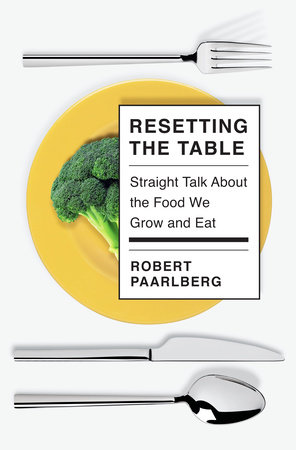Resetting the TableStraight Talk About the Food We Grow and Eat
Consumers want to know more about their food–including the farm from which it came, the chemicals used in its production, its nutritional value, how the animals were treated, and the costs to the environment. They are being told that buying organic foods, unprocessed and sourced from small local farms, is the most healthful and sustainable option.
Now, Robert Paarlberg reviews the evidence and finds abundant reason to disagree. He delineates the ways in which global food markets have in fact improved our diet, and how “industrial” farming has recently turned green, thanks to GPS-guided precision methods that cut energy use and chemical pollution.
He makes clear that America’s serious obesity crisis does not come from farms, or from food deserts, but instead from “food swamps” created by food companies, retailers, and restaurant chains. And he explains how, though animal welfare is lagging behind, progress can be made through continued advocacy, more progressive regulations, and perhaps plant-based imitation meat. He finds solutions that can make sense for farmers and consumers alike and provides a road map through the rapidly changing worlds of food and farming, laying out a practical path to bring the two together.
Extracts:
In 2010, the Research Directorate of the European Union conducted an analysis of more than 150 projects by the EU (non-corporate funded) over two decades and concluded: "Biotechnology, and in particular GMOs, are not per se more risky than e.g. conventional plant breeding technologies" p.173
The European Academies Science Advisory Council (EASAC) reaffirms that breakthroughs in plant breeding technologies, such as genome editing, remain crucial for food and nutrition globally. It remains to be seen what implications this decision [2018 European Justice court ruling] may have outside the EU particularly in developing countries who stand to benefit most from crops that better withstand the devastating effect of climate change" p. 189
Today's wealthy societies, who make the global rules, feel no urgent need to develop novel varieties of food crops or food animals, because their own farmers are already prosperous and their consumers are already well fed, indeed overfed. Perhaps if the rural poor in Africa were making rules, we would see outcomes less timid. p.194
LISTEN TO A SAMPLE FROM RESETTING THE TABLE
“Chapter by chapter, Resetting the Table demolishes the preconceived beliefs of smart eaters raised on progressive, post-1960s culinary social movements . . . Through a mix of history, science and reportage, [Paarlberg] makes a convincing case . . . Resetting the Table is sure to be controversial, and should be widely read and debated.”—Rien Fertel, The Wall Street Journal
Related:
10 February 2021. Consumers want to know more about their food–including the farm from which it came, the chemicals used in its production, its nutritional value, how the animals were treated, and the costs to the environment. They are being told that buying organic foods, unprocessed and sourced from small local farms, is the most healthful and sustainable option. In his new book, Paarlberg delineates the ways in which global food markets have improved our diet, and how “industrial” farming has recently turned green, thanks to GPS-guided precision methods that cut energy use and chemical pollution.
- Book Overview Robert Paarlberg, Adjunct professor of public policy, Harvard Kennedy School; & Associate, Weatherhead Center for International Affairs, Harvard University
- Discussant Robert Bertram, Chief Scientist, Bureau for Resilience and Food Security, United States Agency for International Development (USAID)
- Discussant: Claudia Ringler, Deputy Director, Environment and Production Technology Division, IFPRI
- Moderator Rajul Pandya-Lorch, Strategic and communications leader in food policy and agriculture development
Related:
16 February 2021. Google Talks.
Robert Paarlberg discussed his book "Resetting The Table: Straight Talk about the Food We Grow and Eat", a bold, science-based corrective to the groundswell of misinformation about food and how it’s produced.
Robert gives a road map through the rapidly changing worlds of food and farming, laying out a practical path to bring the two together. A descendant of Midwestern family farmers, Paarlberg examines in detail local and organic food, food companies, nutrition labeling, ethical treatment of animals, environmental impact, and every other aspect of the American food system from farm to table—and finds abundant reasons to disagree with the prevailing messaging to consumers to buy organic, unprocessed foods, sourced from small local farms.
Global food markets have in fact improved the American diet. “Industrial” farming has greatly reduced environmental impact thanks to GPS-guided precision methods that cut energy use and chemical pollution, in addition to reducing land use while producing more crops. America’s very serious obesity crisis does not come from farms, or from food deserts, but from “food swamps'' created by food companies, retailers, and restaurant chains. And, though animal welfare is lagging behind, progress can be made through continued advocacy, more progressive regulations, and perhaps plant-based imitation meat.
Paarlberg, an adjunct professor of public policy at the Harvard Kennedy School and the author of "Starved for Science, Food Politics, and The United States of Excess", offers evidence-based solutions to the challenges of our food system today, ones that make sense for farmers and consumers alike.


No comments:
Post a Comment